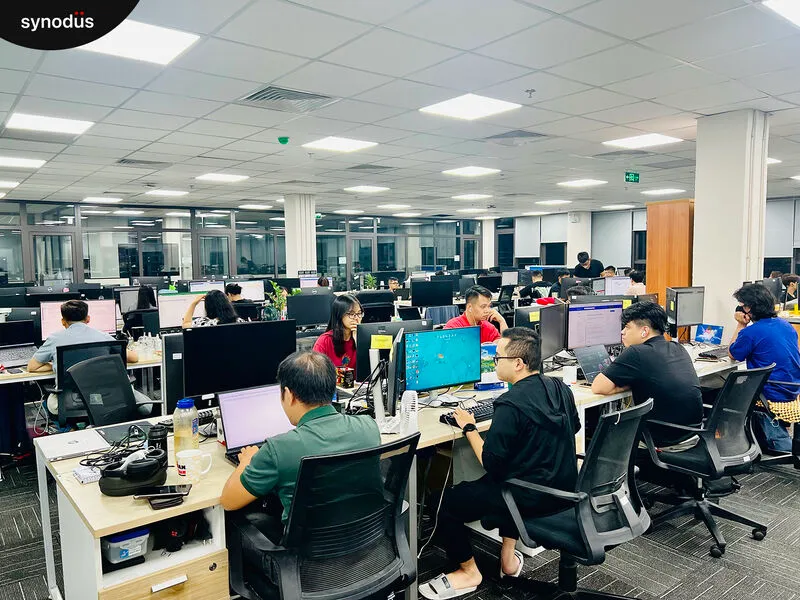Looking to develop a P2P payment app but not sure which partner to trust?
With the global digital payment market projected to hit $32.07trillion by 2033, now is the perfect time for fintech startups, digital banks, and businesses undergoing digital transformation to seize the opportunity.
In this guide, we’ve done the heavy lifting for you by spotlighting 10 trusted P2P payment app development companies for 2026 – firms that have proven expertise in delivering +fast, secure, and scalable payment solutions.
Keep reading to discover which partner can best meet your needs and help you stay ahead of the competition.
Top 10 P2P payment app development companies (Ranked)
Our list of the top 10 P2P payment app development service wasn’t put together based on ads or what companies say about themselves. We relied on real data from trusted platforms like Clutch, GoodFirms, TechReviewer, and Crunchbase, and reviewing real client feedback and actual project case studies.
These companies stand out for their fintech expertise, skilled development teams, and the ability to deliver tailored solutions across markets.
If you’re looking for a proven partner in P2P payment app development, this list is your go-to resource.
| Company | Location | Team size | Rate/hour | Rating |
|---|---|---|---|---|
| Synodus | Vietnam, Singapore | 100+ | <25$/hr | 5/5 |
| Itexus | Warszawa, Poland | 50+ | $25 – $49 / hr | 4.9/5 |
| Netguru | Poland | 400+ | $50 – $99 / hr | 4.4/5 |
| Appinventiv | India | 1000+ | $25 – $49 / hr | 4.7/5 |
| Suffescom | India/US | 250+ | 25 – $49 / hr | 4.8/5 |
| ProtonBits | India | <50 | < $25 | N/A |
| SDK.finance | Lithuania | N/A | N/A | N/A |
| Scalo | Poland | 600+ | $50 – $99 / hr | 4.4/5 |
| Cleveroad | Ukraine | 250+ | $25 – $49 | 4.9/5 |
| Octal IT Solution | India | 50+ | $25 – $49/hr | 4.6/5 |
1. Synodus

Syndus has emerged as a trusted fintech development partner, with over 250 specialists and 30+ successful financial software projects delivered worldwide. Synodus specializes in building scalable P2P payment solutions, from rapid MVP development to robust backend infrastructure that supports complex data flows and multi-currency transactions.
Early in its journey, Synodus noticed a recurring challenge among fintech founders: tight investor timelines, incomplete product scopes, and the need for a team that could turn financial logic into real-world functionality. Instead of merely executing tasks, Synodus become a solution owner, guiding clients from wireframes to working MVPs within weeks.
To address this gap, Synodus refined its process:
- Rapid wireframing and MVP rollout.
- Cloud-native, scalable backend architecture built for high transaction volumes.
- Multi-currency, multi-region support with real-time processing.
- Seamless API and payment gateway integrations.
In one case, a fintech startup in Southeast Asia needed a fast, scalable P2P payment app that could handle real-time money transfers, transaction tracking, and user contact sync. Synodus delivered a complete solution within weeks, integrating QR payments, multi-currency support, and secure encryption. The app quickly scaled to 3 million users, enabling seamless P2P transfers and strategic partnerships through open APIs in its first year.
Key P2P payment development service of Synodus include:
- Build strong and scalable apps.
- Handle frequent and heavy data flows.
- Integrate with multiple services.
- Extend your team seamlessly.
- Leverage low code.
- BI & Advanced analytics.
- Launch your MVP swiftly.
- UI/UX design.
whether you’re a startup launching an MVP or a fintech scaling P2P operations, Synodus blends speed, cost-efficiency, and deep fintech expertise to turn ambitious ideas into market-ready products.
Build smarter, scale faster, and save more – all with a fintech-first approach
2. Itexus
Itexus brings over a decade of fintech experience, delivering more than 300 financial projects across 23+ countries. Their P2P payment app solutions are designed to meet the needs of underbanked communities, digital wallet startups, and cross-border payment services.
This firm provide end-to-end services for P2P payment app service service, including:
- Custom P2P app development from ideation to launch.
- Payment gateway & bank API integration.
- KYC automation systems and identity verification.
- Advanced UX/UI design for seamless transfer flows.
- Contact-based payments (e.g., phonebook or email-based transfers).
- Multi-device, cross-platform app delivery.
- Compliance implementation for local and global financial regulations.
- Infrastructure scaling and backend optimization.
Their core strength lies in building full-featured payment apps that prioritize onboarding speed, transaction transparency, and security. They implement features like QR code payments, fingerprint and facial recognition, and in-app identity verification to streamline P2P user flows.
One standout project involved developing a mobile banking app specifically targeting over 30 million underbanked migrant workers in the U.S. This app featured: Real-time P2P money transfers, virtual card issuance, early wage access, “Family Mode” for shared spending as well as integrations with Plaid and Mbanq for secure KYC and AML compliance
Startups and SMEs building mission-driven P2P payment apps, especially those tartgeting financial inclusion and underserved user groups.
3. Netguru
Based in Poland, Netguru is a globally recognized software development company specializing in fintech and digital banking. With 15+ years of experience, the firm helps startups and enterprises build secure, regulation-ready P2P payment platforms tailored for emerging and developed markets alike.
This firm provides end-to-end services for P2P payment app development service, including:
- Custom money transfer solutions (mobile & web)
- KYC/AML automation and regulatory compliance
- User experience (UX) and user interface (UI) Design.
- Integration with Payment Gateways.
Netguru combines design-led thinking, compliance expertise, and scalable engineering to promote financial inclusion. Beyond development, they offer strategic fintech advisory that helps startups create sustainable, growth-ready ecosystems.
A key example is their work with FairMoney in Nigeria, where Netguru developed a scalable P2P payment platform capable of handling milions of transactions daily while maintaining security and compliance. This included integrating real-time payment tracking, cross-border transactions, and advanced fraud detection – features crucial for any high-volume P2P payment system.
4. Appinventiv

Appinventiv, founded in 2015, has grown from a small startup into a 1,600 member fintech powerhouse. With a strong footprint in the P2P payment and digital banking sectors, the company is known for delivering secure, scalable, and regulation-ready financial solutions.
This firm handles all aspects of P2P payment app development, such as:
- Custom P2P payment app development
- Regulatory compliance and security
- UI/UX design focused on usability and trust
- Advanced technology integration
- Maintenance and support
Appinventiv’s development framework emphasizes end-to-end encryption, tokenization, biometric and multi-factor authentication, ensuring that every transaction remains secure and compliant. Their solutions align with PSD2 and PA-DSS standards, significantly reducing fraud and data breach risks.
A notable project includes their work with is Mudra, an AI-powered budgeting application that simplifies personal finance management. In this project, Appinventiv integrated real-time P2P payment features directly into an AI chatbot interface, enabling users to send and receive money instantly, access transaction histories, and receive personalized financial insights.
However, the wide cost range ($30,000–$300,000) may pose budgeting challenges for early-stage startups. That said, Appinventiv remains a highly suitable choice for mid-sized and large enterprises operating across multiple regions and requiring globally compliant P2P payment platforms.
5. Suffescom Solutions
Suffescom Solutions Inc. is a trusted name in software development, with over 13 years of experience and a team of more than 350 experts. While Suffescom is also well-known for its Web3 consulting services, the company has carved out a solid presence in P2P payment app development. Their P2P solutions are tailored for both fiat and cryptocurrency ecosystems use cases, enabling easy fund management and seamless cross-border transactions.
Suffescom Solutions delivers complete P2P app solutions, including:
- Custom P2P money transfer app development
- UPI payment app development
- P2P cryptocurrency exchange development
- Whitelabel P2P app solutions
Suffescom’s key advantage lies in enabling cross-border, multi-currency transactions with integrated KYC/AML comliance and wallet-level security. They combine blockchain-backed transparency with traditional payment reliability, making it easier for startups to launch hybrid P2P platforms quickly without heavy upfront investment.
Their work on HyperPay, a digital asset wallet that supports global payments. Beyond basic wallet functions, HyperPay incorrporates P2P payment features such as contact-based transfers, real-time transaction tracking, and error handling to ensure seamlesss money movement. The app has achieved over 100,000 downloads and supports more than 50 million merchants, highlighting its scalability and relevance in the crypto-enabled P2P space.
Suffescom is an ideal partner for startups and small businesses aiming to enter the P2P payments market with minimal development time and cost. In addition, their ready-made clone scripts and custom crypto exchange solutions make them a great fit for companies entering the crypto P2P ecosystem.
6. ProtonBits
ProtonBits is a reliable partner for building P2P payment apps that are simple, secure, and efficient. The company’s strength lies in its deep expertise with Ruby on Rails, allowing it to develop scalable systems that prioritize both high performance and safety.
This firm provides end-to-end services for P2P payment app development service, including:
- P2P payment app development
- Payment gateway integration (Stripe, PayPal, Braintree)
- Mobile payment solutions
- Automated billing and invoicing systems
- Multi-currency and cross-platfrom support
ProtonBits has collaborated with a wide range of fintech startups in the US, UK, and UAE, delivering apps that streamline everyday peer-to-peer interactions such as bill splitting, reimbursements, and internal staff payments. While detailed case studies are not publicly disclosed, their consistent performance in these markets demonstrates a solid record of reliability and scalability.
ProtonBits is a strong fit for mid-budget fintech startups with funding in the $20,000–$80,000 range. They’re especially recommended for:
- Startups building an MVP to test the market or raise capital.
- Businesses needing internal P2P payment apps for employees, agents, or partners.
7. SDK.finance
SDK.finance is a leading white-label fintech platform that powers scalable and ecure P2P payment solutions. With the ability to handle over 34 million transactions daily, this platform demonstrates exceptional scalibility and consistent performance, making it ideal for businesses requiring large-scale P2P payment systems.
This firm offers complete P2P app development support, such as:
- P2P transfers solution
- Payment processing system
- Core banking infrastructure
- KYC/AML compliance modules
- Customizable UI/UX
SDK.finance offers a hybrid deployment model. Clients can use cloud-based backend services while maintaining on-premise control over critical data. This makes the platform especially appealing to organizations that require both scalability and strict data sovereignty.
Let’s explore two key projects demonstrate their capabilities in P2P payment developemt:
- MPAY Digital Wallet (Azerbaijan): SDK.finance enabled real-time P2P transfers via phone numbers, integrated biometric authentication (SIMA İmza), and added a full transaction ledger. As a result, user engagement and transaction volume increased significantly.
- Super App in the Maghreb Region: SDK.finance built an integrated wallet with instant P2P transfers inside a ride-sharing and food delivery app. The platform handled up to 230 million daily transactions, helping boost user retention and streamline everyday payments.
SDK.finance is best suited for banks, fintech startups, and digital wallet providers that want a ready-to-launch, modular P2P payment system with enterprise-grade compliance and performance.
8. Scalo
Scalo delivers backend-heavy P2P payment solutions designed for high performance and financial-grade security. Their edge lies in its ability to integrate directly with banking networks, implement real-time fraud detection, and modernize outdated infrastructure without disrupting business operations. These capabilities are critical for P2P features like instant transfers, biometric login, and transaction history visibility.
Now, Scalo provides end-to-end services for P2P payment app development service, including:
- Custom-built P2P money transfer applications
- Behavior-based identity verification
- Scalable backend architecture for high transaction loads
- Simple, responsive interfaces for mobile users
While Scalo hasn’t shared specific P2P case studies, their partnerships with major financial institutions such as ING, Santander, and BNP Paribas confirm their credibility in the space. They’re also ISO 27001-certified and hold the Microsoft Gold Partner status.
Scalo is a great fit for:
- Traditional banks enhancing mobile apps with P2P payment features
- Pre-seed or seed-stage fintech startups validating P2P product ideas
- E-commerce or service platforms that need internal P2P transfers between users, sellers, or agents.
With its enterprise-level security and deep banking expertise, Scalo bridges the gap between traditional finance and modern peer-to-peer ecosystems.
9. Cleveroad

Founded in 2011, Cleveroad has built a solid track record in fintech by helping businesses transform peer-to-peer (P2P) payment ideas into fully functional applications. With deep experience working alongside financial clients, the company delivers end-to-end solutions – guiding products from concept through launch.
Their P2P payment app development services include:
- Custom software development tailored to specific P2P needs.
- Mobile app development across platforms (iOS, Android, cross-platform).
- UI/UX design focused on clarity and engagement.
- Integration of AI, machine learning, and secure payment gateways.
- Full compliance with PCI DSS, KYC, GDPR, ISO/IEC 27001:2013.
A key advantage of Cleveroad is its speed-to-market approach. Thanks to their offshore R&D centers, clients get access to top-tier tech and talent while staying within budget. It’s a practical approach that suits early-stage companies trying to move quickly without overspending.
The company also offers a free P2P solution design workshop, allowing potential clients to evaluate feasibility, outline system architecture, and refine their product vision before development begins.
Cleveroad’s credibility is reinforced by collaborations with HSBC and MoneyWiz, along with certifications in ISO 9001 and ISO 27001, underscoring its commitment to software quality and data security.
Cleveroad is best suited for fintech startups seeking rapid, secure, and cost-effective P2P payment app development with enterprise-grade compliance.
10. Octal IT Solution
With over 15 years of experience in fintech, Octal IT Solution specializes in building secure, enterprise-ready P2P payment apps for companies targeting regulated and global markets. The company stands out for its in-house compliance expertise, meeting standards like PCI DSS, GDPR, and ISO 27001 – without depending on third-party consultants.
Their P2P payment development services include:
- Digital wallet architecture and interface design.
- Real-time money transfer and transaction logic.
- Blockchain and crypto wallet integration.
- Multi-currency and real-time exchange engine.
- AI/ML-based fraud detection systems.
- Bank-grade authentication using biometrics and two-factor authentication.
What makes Octal a reliable partner is its ability to deliver end-to-end fintech ecosystems, covering cross-border transfers, instant settlements, and crypto-fiat interoperability – within a unified, secure framework.
Plus, their team of over 250 in-house specialists works within a CMMI Level 3–appraised framework, ensuring a solid balance between structure and agility. This allows clients to benefit from robust processes without the high cost of traditional enterprise consulting.
Octal is best suited for:
- Mid-sized fintech companies with budgets between $50k–$200k.
- Teams launching international P2P apps involving fiat and crypto payments
- Businesses seeking a single full-stack fintech development partner
Why global startups are turning to APAC fintech developers
Asia-Pacific has quietly become a go-to region for fintech software development, and for good reason. Startups from the U.S. and Europe increasingly collaborate with APAC teams build P2P and payment solutions faster, at lower costs, and without compromising compliance.
The region offers a rare combination of affordability, technical expertise, and fintech-specific experience. Developers in Vietnam, India, and Singapore have deep knowledge of digital wallets, neobank development, and payment gateway integration, alongside familiarity with standards like PSD2, PCI DSS, and AML/KYC frameworks.
Beyond cost advantages, APAC firms stand out for their speed and flexibility. With agile teams and full-stack delivery models, they help startups launch MVPs in weeks – not months – while ensuring scalability for global markets.
Synodus, based in Vietnam, exemplifies this new generation of APAC fintech partners. With end-to-end experience cross 15+ countries, we combine regional efficiency with global delivery standards to help startups worldwide bring their P2P payment ideas to life quickly and securely.
How to shortlist the right partner for your P2P app
After exploring top vendors, the next is to identify which partner best fits your business and technical goals. The right choice will define not only how quickly your app goes to market, but also how securely and smoothly it scales over time.
Here’s a concise checklist to guide your delection:
- Proven track record: Look for teams with hands-on experience in P2P or fintech projects that handle high transaction volumes.
- Compliance expertise: Ensure they’re familiar with key regulations like GDP, KYC/AML, and PCI DSS, and can tailor compliance to your operating regions with a strong focus on fintech app security and user data protection.
- Scalable architectures: Ask how they manage real-time transactions, cross-border payments, and infrastructure scaling as user demand grows.
- Long-term support: A strong partner offers ongoing maintenance, updates, and technical enhancements post-launch.
Selecting a P2P app development company is ultimately about trust and capability – the ability to turn your payment vision into a secure, compliant, and user-friendly experience.
Conclusion
A successful P2P pyament app depends on finding a partner who can balance security, compliance, scalability, and user experience from the very beginning.
The companies highlighted above demonstrate what reliable P2P fintech development looks like: deep industry expertise, proven delivery processes, and the ability to turn complex payment flows into seamless user journeys.
Ultimately, the best partner is the one who understands your business goals as clearly as your technical needs, ensuring every transaction is fast, secure, and built for growth.
How useful was this post?
Click on a star to rate it!
Average rating / 5. Vote count:
No votes so far! Be the first to rate this post.




